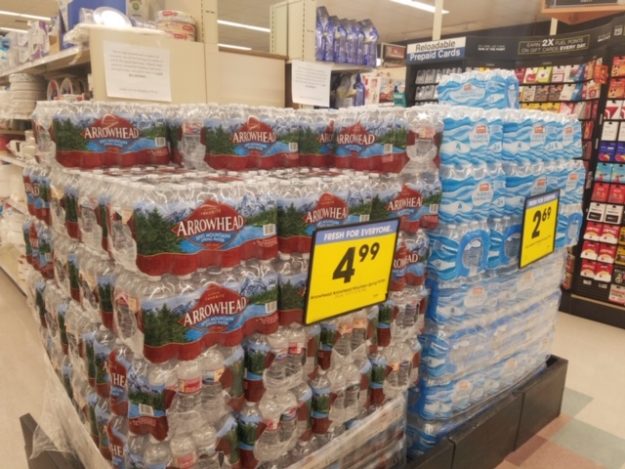Widgetized Section
Go to Admin » Appearance » Widgets » and move Gabfire Widget: Social into that MastheadOverlay zone
Don’t worry about tap water in COVID-19 crisis, but stay vigilant on every other front

Over the weekend, Eagle County tragically saw the second death of a local resident who contracted the COVID-19 virus, a Gypsum man in his 40s. RealVail.com also interviewed Jill Hunsaker Ryan, the state’s top health official, on the positive test of her husband, Taylor.
Due to an oversight, one important quote from Ryan, who is the executive director of the Colorado Department of Public Health and Environment, didn’t make it into that story, which first appeared in the Colorado Springs Gazette:

“I have asthma and so does my son, and that’s another reason we were trying to make preparations and do the social distancing and follow initially it was the orders of Eagle County public health and then later our own orders at the state,” Ryan said of her family’s self-imposed isolation in their Edwards home since Friday, March 13. “But people that have preexisting conditions just need to be extra vigilant even once stay-at-home orders are lifted.”
In Colorado, that order is through April 11, but look for it to possibly be extended in the wake of President Donald Trump on Sunday mandating social distancing guidelines through at least April 30. National experts are recommending an even longer period of travel limits, shuttered businesses, closed schools and other measures to stop the rampant spread of the virus.
Locally, as of Sunday, the early Colorado hot spot of Eagle County keeps dropping down the state list of most infected counties – owing largely to higher populations on the state’s Front Range. According to state data, Eagle County has 187 confirmed cases, compared to 408 for Denver, 241 for Arapahoe County, 214 for El Paso County and 213 for Jefferson County.
That now puts Eagle County at fifth on the list, but the county’s own numbers show 246 confirmed cases, and all the numbers are likely way behind the actual curve due to the lack of testing.
One thing, however, that local residents should not be worried about as they stay at home and maintain physical distancing is the water coming out of their taps. RealVail.com on Saturday contributed the following story to several local papers through a funding partnership with Aspen Journalism. The story appeared in both the Vail Daily and the Aspen Times.
Colorado water officials on COVID-19 hoarding: ‘Quit buying bottled’
Aspen Journalism
AVON — Municipal water providers in Aspen, Vail, Steamboat and other communities say there is no threat from COVID-19 in their water supplies and that people do not need to hoard bottled water. At least not as long as the employees who operate the various water plants can still come to work.
And yet, two weeks into the crisis, you still see them coming out of grocery stores all over Colorado: hoarders with shopping carts over-heaping under the burden of multi-roll packs of 4-ply Charmin and Angel Soft toilet paper. And under the TP you’ll spot the 48-bottle cartons of Arrowhead and FIJI water.
The TP thing aside, water systems operators around the state, including some of the hardest-hit areas for the novel coronavirus pandemic — ski towns — do not understand why people think they need to stock up on bottled water.
The same is true for Front Range water utilities.
“We have wastewater treatment facilities that work above and beyond the standards devised for us, so there is no worry that water would be impacted by COVID-19,” said Ryan Maecker, spokesman for Colorado Springs Utilities, where surrounding El Paso County now has the second highest number of confirmed COVID-19 cases in the state behind only Denver.
Those drinking water standards were established by the Safe Drinking Water Act in 1974 and are enforced by the U.S. Environmental Protection Agency and Colorado Department of Public Health and Environment.
“The water is treated and it’s disinfected, which takes care of all viruses,” said Linn Brooks,general manager of Eagle River Water and Sanitation District in eastern Eagle County — an area of the state with the third-highest number of confirmed COVID-19 cases.
Officials say water should be the least of anyone’s concerns during the growing outbreak that’s prompted an unprecedented statewide stay-at-home order and seen most non-essential businesses and schools shut down across the state.
“No, there are no water shortages; no, municipal water is not a vector for COVID-19,” said Zach Margolis, utility manager for Silverthorne Water & Sewer in Summit County.
This is how COVID-19 spreads:
“The virus is thought to spread mainly from person-to-person between people who are in close contact with one another (within about 6 feet) — through respiratory droplets produced when an infected person coughs or sneezes,” according to the U.S. Centers for Disease Control and Prevention (CDC). “These droplets can land in the mouths or noses of people who are nearby or possibly be inhaled into the lungs.”
Michelle Carr, distribution and collection manager for the City of Steamboat Springs Water and Sewer, attended a CDC webinar on the topic of COVID-19 and drinking water systems.
“It said that the coronavirus is essentially very susceptible to our disinfection processes, and that while our disinfection process targets bacteria, bacteria is less susceptible than this virus,” Carr said. “So the fact that we’re treating for killing bacteria means that we should adequately be taking care of the COVID virus.”
Buying bottled water during the ongoing pandemic makes no sense, Carr added.
“Our water is completely safe to drink,” Carr said. “I don’t anticipate that there will ever be an issue where we’re spreading COVID-19 through the treated potable water system.. [MOU2] [DOW3] The bottled water is completely unnecessary.”
Brooks won’t speculate on TP hoarding but does have a theory on bottled water.
“I think that the reason people are stocking up on bottled water is because they see communications on how to isolate at home, how to prepare to a shelter in place, how to deal with emergencies, and those instructions almost always tell you to get bottled water,” said Brooks, adding that some people inexplicably do prefer to drink bottled water all the time.
“I don’t particularly understand that because our water here is so great, and [bottled water] certainly has an environmental impact,” Brooks said.
Staffing concerns
Various municipal, county and state emergency declarations have been enacted, covering water systems, but officials say those mostly just allow them to apply for state and federal funds or obtain additional equipment if necessary. Most water providers and wastewater treatment operators are planning for staff shortages and doing everything they can to keep staff healthy.
“We are not aware of any specific threats to our water system,” said Aspen’s Rapkin. “We have taken proactive measures to isolate our operations staff in order to continue to provide this critical community resource.”
Brooks agrees that staffing is the biggest concern as the virus spreads.
“Our biggest risk is absenteeism of our operators,” Brooks said. “But, that being said, we can run with a pretty lean crew even if we got into some pretty significant absenteeism, as long as it doesn’t hit everyone at once, which we don’t think is likely at all.”
ERWSD, which provides and treats water from East Vail to Wolcott along Interstate 70, took steps to mitigate against absenteeism early on
“We knew that that was going to be our biggest risk and that protecting our employees was the most important thing that we could do. That’s our highest priority is to keep our staff healthy,” said Brooks, who added that any staffer with any symptom of any kind must stay home from work and not return until they’re symptom-free for 72 hours.
Even if smaller mountain utilities were to suddenly be hit by a COVID-19 outbreak and get into staffing problems, other water systems operators would step in to help. A cooperative venture between all utilities across the state, codified with intergovernmental agreements (IGA’s), dictates if a utility needs assistance, others will go to their aid.
“So if there’s somebody that has a plant failure, and we have staffing, we will send our staffing to them,” City of Aurora Water Department spokesman Greg Baker said on a call with other Aurora and Colorado Springs water officials. “I know Colorado Springs has been heavily involved in [mutual assistance] as well, so that should really not be a major concern.”
Bottled water hoarding, on the other hand …
“The bottled water hoarding is a phenomenon we do not understand, because we bring safe, high-quality drinking water to your house,” Baker said. “We deliver it for a half a penny a gallon, so why are people going out and buying water? We do not understand that at all.”
All the plastic is an environmental issue, Baker adds, and transporting it around the state or out of state in bottles removes local water from Aurora’s extensive reuse system for irrigation and agriculture.
“So whenever people take bottled water and start shipping it out, you’re kind of losing that reusable component, and that impacts our culture because we’re so used to reusability. So that hurts us there,” Baker said.
“It also hurts us through the fact that, frankly, we have some of the highest quality water in the state, and why do you need it in a bottle? It’s as irrational as the toilet paper hoarding as well.”
Aspen Journalism collaborates with The Vail Daily, The Aspen Times and other Swift Communications newspapers on coverage of water and rivers. For more, go to aspenjournalism.org.



Salvador
March 30, 2020 at 1:49 pm
It’s nice to stay at home with this vyrus but we have to work bills and rent don’t wait Eagle river village owner they are sitting waiting for rent if we don’t paid its 100 dollars every day charge